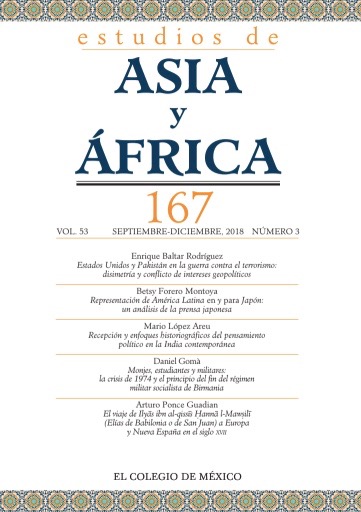Resumen
La teoría política contemporánea está dominada por las ideas y los valores del pensamiento occidental moderno; sin embargo, tras el proceso de descolonización en Asia y África se ha abierto un importante debate acerca de la continuidad y la legitimidad de esas ideas en sociedades poscoloniales. Se presentan las dos principales corrientes historiográficas que conforman esta discusión en la ciencia política de la India contemporánea a través del análisis de sus principales autores y obras: la corriente hermenéutica, que defiende que el pensamiento político indio moderno es resultado de un proceso de fusión entre conceptos y valores occidentales con las ideas indias tradicionales, y la corriente indigenista, que aboga por el desarrollo de una ciencia política india autónoma respecto a las ideas y los valores occidentales.
Referencias
Bayly, C. (1996). Empire and information: intelligence gathering and social communication in India (1780-1870). Cambridge: Cambridge University Press.
Bayly, C. Afterword. En S. Kapila (Ed.), An intellectual history for India. Cambridge: Cambridge University Press.
Bayly, C. (2012). Recovering liberties: Indian thought in the age of liberalism and empire. Cambridge: Cambridge University Press.
Bhandarkar, D. R. (1929). Some aspects of ancient Hindu polity. Benarés: Banaras Hindu University.
Bhattacharya, K. C. (1954). Swaraj in ideas. Visvabharati Quarterly, 20, 103-114.
Chatterjee, P. (1986). Nationalist thought and the colonial world: a derivative discourse. Londres: Zed Books.
Chatterjee, P. (1996). Whose imagined communities?. En G. Balakrishnan (Ed.), Mapping the nation. Londres: Verso.
Dandekar, R. N. (1998). Artha: the second end of man. En A. T. Einbree (Ed.), Sources of Indian tradition, vol. I. Nueva York: Columbia University Press.
Datta, P, K. y Palshikar, S. (2013). Indian political thought. Nueva Delhi: Oxford University Press.
Das, V. (1989). Subaltern as a perspective. En R. Guha (Ed.), Subaltern Studies VI: writings on South Asian history and society. Nueva Delhi: Oxford University Press.
Dumont, L. (1980). Homo Hierarchicus: the caste system and its implications. Chicago: Chicago University Press.
Gramsci, A. (2003). Selections from the prison notebooks. Londres: Lawrence and Wishart.
Gramsci, A. (2007). Quaderni de la carcere, vol. VI. Turín: Instituto Gramsci.
Guha, R. (1982). On some aspects of the historiography of colonial India. En R. Guha (Ed.), Subaltern Studies I: writings on South Asia history and society. Nueva Delhi: Oxford University Press.
Guha, R. (1983). Elementary aspects of peasant insurgency in colonial India. Durham: Duke University Press.
Guha, R. (1989). Dominance without hegemony and its historiography. En R. Guha (Ed.), Subaltern Studies VI: writings on South Asia history and society. Nueva Delhi: Oxford University Press.
Heesterman, J. (1985). The inner conflict of tradition: essays in Indian ritual, kinship and society. Chicago: Chicago University Press.
Hobsbawm, E. (1971). Primitive rebels: studies in archaic forms of social movement in the 19th and 20th centuries. Manchester: Manchester University Press.
Jayaswal, K. (2005). Hindu polity: a constitutional history of India in Hindu times. Nueva Delhi: Chaukhamba Sanskrit Pratishthan.
Joseph, S. (1991). Indigenous social science project: some political implications. Economic and Political Weekly, 26(15), 959-963.
Kapila, S. (Ed.) (2011). An intellectual history for India. Cambridge: Cambridge University Press.
Kaviraj, S. (1997a). Politics in India. Nueva Delhi: Oxford University Press.
Kaviraj, S. (1997b). The modern state in India. En M. Doornbos y S. Kaviraj (Eds.), Dynamics of state formation: India and Europe compared. Nueva Delhi: Sage.
Kaviraj, S. (2010). The imaginary institution of India. Nueva York: Columbia University Press.
Khilnani, S. (1997) The idea of India. Nueva Delhi: Penguin.
Mehta, V. R. (1992). Foundations of Indian political thought. Nueva Delhi: Manohar.
Nandy, A. (1983). The intimate enemy: loss and recovery of self under colonialism. Nueva Delhi: Oxford University Press.
Pantham, T. (1986). Introduction: for the study of modern Indian political thought. En T. Pantham y K. Deutsch (Eds.), Modern Indian political thought. Nueva Delhi: Sage.
Parekh, B. (1986). Some reflections on the Hindu tradition of political thought. En T. Pantham y K. Deutsch (Eds.), Modern Indian political thought. Nueva Delhi: Sage.
Pinch, W. (1991). Same difference in India and Europe. History and Theory, 38(3), 389-407.
Kumar Sarkar, B. (1939). The political institutions and theories of the Hindus: a study in comparative politics. Calcuta: Chuckervertty, Chatterjee & Co.
Singha, R. (1998). Civil authority and due process: colonial criminal justice in the Banaras zamindari, 1781-1795. En M. Anderson y S. Guha (Eds.), Changing concepts of rights and justice in South Asia. Nueva Delhi: Oxford University Press.
Vajpeyi, A. (2013). Righteous republic: the political foundations of modern India. Cambridge, Mass.: Harvard University Press.
Esta obra está bajo una licencia internacional Creative Commons Atribución-NoComercial-SinDerivadas 4.0.
Derechos de autor 2022 Estudios de Asia y África


